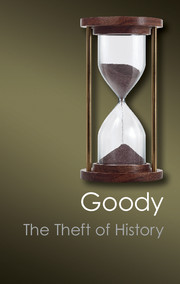Book contents
- Frontmatter
- Contents
- Acknowledgements
- Introduction
- Part One A socio-cultural genealogy
- Part Two Three scholarly perspectives
- Part Three Three institutions and values
- 8 The theft of institutions, towns, and universities
- 9 The appropriation of values: humanism, democracy, and individualism
- 10 Stolen love: European claims to the emotions
- 11 Last words
- References
- Index
9 - The appropriation of values: humanism, democracy, and individualism
Published online by Cambridge University Press: 05 July 2014
- Frontmatter
- Contents
- Acknowledgements
- Introduction
- Part One A socio-cultural genealogy
- Part Two Three scholarly perspectives
- Part Three Three institutions and values
- 8 The theft of institutions, towns, and universities
- 9 The appropriation of values: humanism, democracy, and individualism
- 10 Stolen love: European claims to the emotions
- 11 Last words
- References
- Index
Summary
In an earlier chapter, I explained how classicists had claimed for the European Antiquity of Greece and Rome the very origin of democracy, freedom, and other values. Equally at a later period the notion of humanism and of humanistic studies was appropriated by the Occident for its own particular history. The claim was exaggerated and overlooked the question of representation, of liberties, of human values in other communities. But it is one that, even more shrilly today, the west has continued to make, arrogating to itself the effective monopoly of these virtues. One of the most disturbing myths of the west is that the values of our ‘Judeo-Christian’ civilization have to be distinguished from the east in general and from Islam in particular. For Islam has the same roots as Judaism and Christianity as well as many of the same values. Forms of representation existed in most societies, especially in tribal regimes, though not ‘democratic’ by most contemporary electoral standards. However, western democracy has hijacked many of the values that certainly existed in other societies, humanism and the triad individualism, equality, freedom, as well as the notion of charity that has been seen as a particularly Christian virtue. However there is no general agreement on what constitutes a virtuous life in the west, so this treatment will necessarily appear somewhat scrappy. I have selected some of the more prominent, talked-about qualities claimed by the west.
- Type
- Chapter
- Information
- The Theft of History , pp. 240 - 266Publisher: Cambridge University PressPrint publication year: 2012

